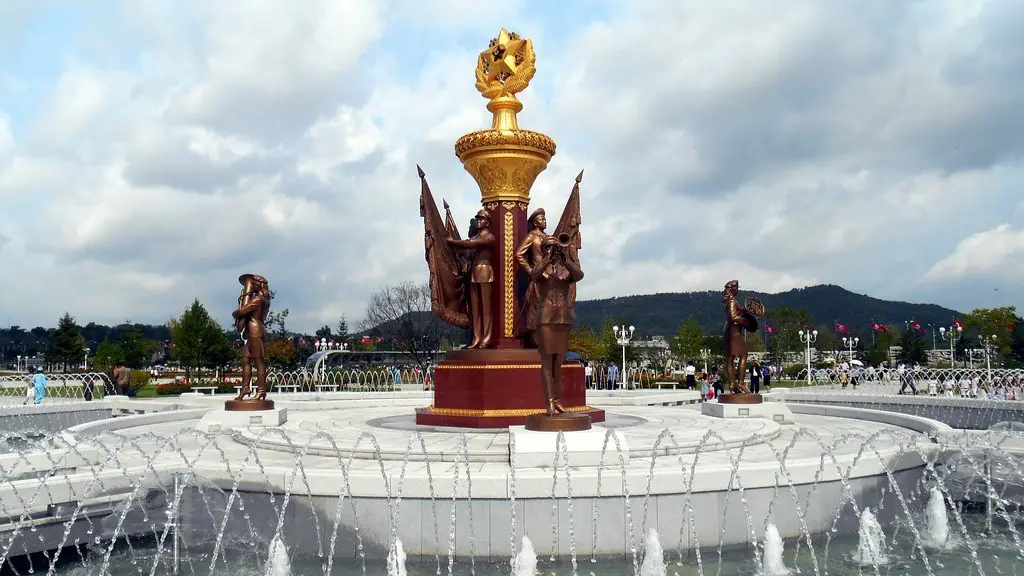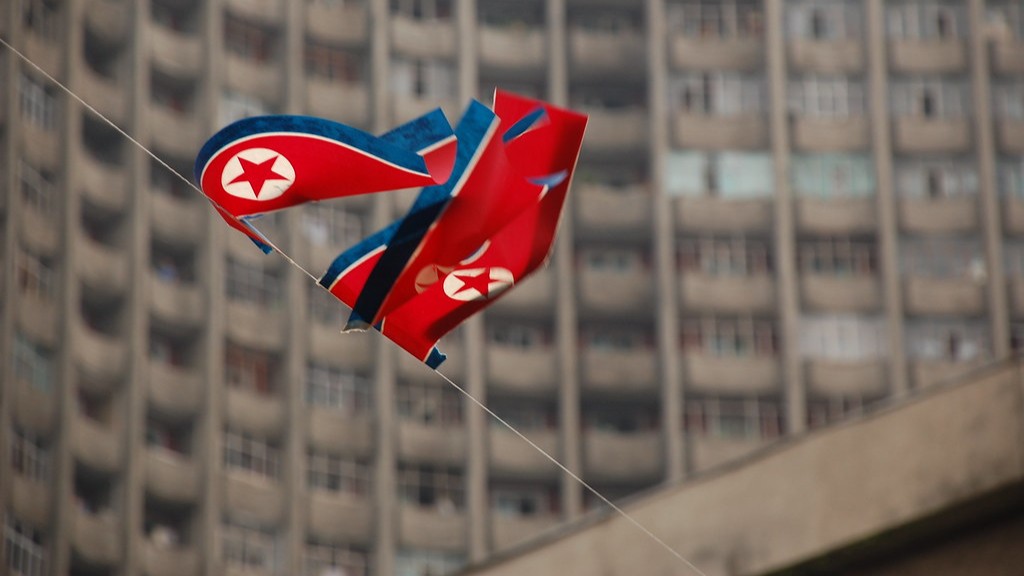Where is North Korea’s Nuclear Test Site?
North Korea has been conducting nuclear tests since 2006, with its first detonations set off in the Punggye-ri Nuclear Test Site. The site is located near the small village of Hwasong-ni, tucked away in the mountainous north-eastern corner of the country.
The Punggye-ri Nuclear Test Site is a secured area located within the North Korea-China border. It’s surrounded by a heavily guarded and monitored perimeter featuring roads, bunkers, surveillance points, and military checkpoints. Narrow mountain passages and an unmanned aerial vehicle (UAV) surveillance system also make it difficult for unauthorized personnel to enter the area.
The site was initially developed by North Korean officials for testing conventional ammunition. However, the facility was transformed into a nuclear test site shortly after the country conducted its first nuclear test in October 2006. Since then, North Korea has staged six underground nuclear tests at the site, the last one being in September 2017.
What are the Implications of Nuclear Tests?
Nuclear tests have significant implications for global security, public health, and the environment. They are some of the most destructive weapons and could have devastating short- and long-term consequences.
Firstly, nuclear tests have a direct impact on global security. Radiations released during a nuclear test can travel thousands of miles away from the detonation site, potentially affecting the health of vulnerable populations living far away from the test site. North Korea’s nuclear tests triggered sonic booms and earthquakes in other countries, such as China and Russia, and raised fears among governments of the whole world.
In the longer term, any nuclear tests pose a threat to public health and to the environment. According to the World Health Organization (WHO), nuclear testing has led to increased levels of radiation-induced illnesses, including some rare types of cancer. Additionally, the plutonium emitted by the detonation of a nuclear bomb can remain in the environment in the form of radioactive particles and travel with the wind or be absorbed by drinking water, causing health damage to people.
Furthermore, the United Nations Environment Program (UNEP) reported that nuclear tests have a damaging effect on marine life, ecosystems, and land animals, leading to a reduction in biodiversity.
What Measures Are Taken to Prevent Nuclear Tests?
The international community has come together to address the risks posed by nuclear tests and take preventive measures. The Comprehensive Nuclear-Test-Ban Treaty Organization (CTBTO) was created in 1996 to support the implementation of the Comprehensive Nuclear-Test-Ban Treaty (CTBT). The CTBT aims to prevent any country from conducting any type of nuclear test by establishing a global monitoring system that tracks for any signs of a nuclear test.
The Russia-China Initiative (RCI) is also a useful tool for preventing nuclear tests. The RCI was created in 2011 with the aim of reducing the risk of nuclear tests by providing an alternative approach to crisis management. The main activities undertaken by the RCI include negotiation and deterrence, as well as confidence-building activities.
What is North Korea’s Role in Nuclear Tests?
Although North Korea has declared it is committed to denuclearizing the Korean Peninsula, it has not yet signed the CTBT or the RCI. This means that the country is still able to conduct nuclear tests at the Punggye-ri Nuclear Test Site.
Due to increasing threats of nuclear war and the risk of a nuclear arms race in the region, the international community has become increasingly concerned about North Korea’s nuclear tests and the potential implications they may have on global security. The United Nations Security Council has urged North Korea to cease its nuclear weapon and ballistic missile programs, and has adopted a number of resolutions to strengthen sanctions against North Korea.
Despite these sanctions, North Korea continues to conduct nuclear tests at the Punggye-ri Nuclear Test Site. This risks further destabilizing the region and provoking an arms race amongst other countries in the region. As such, the international community must take a firm stance and ensure that North Korea adheres to restrictions on nuclear tests.
How do North Korea’s Tests Affect International Law?
North Korea’s nuclear tests have raised concerns among the international community regarding the legitimacy of international law. Although North Korea is a signatory to the Nuclear Non-Proliferation Treaty, it has not signed the CTBT or the RCI and has continued to violate international anti-nuclear testing laws on multiple occasions.
This has prompted questions as to whether international law is effective in deterring countries from conducting nuclear tests. It has also raised doubts about the ability of the international community to enforce international law and ensure its compliance.
Furthermore, North Korea’s refusal to sign the CTBT is an important factor in deciding whether other countries follow the law and comply. North Korea’s actions have put pressure on the international community to come up with solutions to prevent further nuclear tests and find ways of ensuring compliance.
What is the Impact of North Korea’s Nuclear Tests on its Neighbors?
The international community is concerned about the impact of North Korea’s nuclear tests on its neighbors. South Korea, Japan, and China have all voiced their opposition to North Korea’s nuclear tests and urged the country to abide by international law.
In particular, the detonations of nuclear weapons have created tension between North and South Korea, who have a long history of conflict and are technically still at war. South Korea remains particularly vulnerable to the risks posed by the nuclear arms race in the region, particularly because of its proximity to North Korea.
The nuclear tests have also caused concern in Japan, which is arguably in an even more precarious position. Japan relies heavily on the United States for protection, but it is also very close to North Korea, which possesses a significant stockpile of nuclear weapons.
What is the Outlook for North Korea’s Nuclear Tests?
North Korea’s nuclear program remains a major point of concern for the international community and future nuclear tests could further destabilize the region. Despite international sanctions, the country is reportedly continuing to develop its nuclear capabilities and the United States has not been able to negotiate an end to its nuclear program.
In the meantime, the UN is working to increase the number of international observers at the Punggye-ri test site to monitor the situation. The international community is also keeping a close eye on the situation, but it remains unclear what the outlook is for North Korea’s nuclear tests.
What Lessons Can be Learned From North Korea’s Nuclear Tests?
North Korea has demonstrated that nuclear weapons are a real threat and that nuclear tests can have serious consequences for global security. This has highlighted the need for greater global cooperation in order to prevent any further nuclear tests from taking place.
The international community must also continue to hold North Korea accountable for its actions and ensure that it adheres to international law. Additionally, it is important for the world to learn from North Korea’s nuclear tests and to continue to work towards achieving global peace and stability.
What Are the Alternative Solutions to North Korea’s Nuclear Tests?
The international community must work together to find alternative solutions to North Korea’s nuclear tests. This will involve meaningful dialogue between North Korea and its neighbours, as well as international sanctions, diplomatic negotiations, and other confidence-building measures.
Furthermore, the UN Security Council must take a firm stance against North Korea and seek to maintain international stability and peace. This includes addressing the root causes of North Korea’s nuclear ambitions, such as poverty and famine, and providing the country with economic development aid.
It is also important for countries in the region to take a united stance and cooperate with one another in order to find an effective solution. To this end, the international community must ensure that all involved countries remain committed to international peace and security and work together to reach an agreement.
What are the Risks of North Korea’s Continued Nuclear Tests?
The continued nuclear tests in North Korea pose a threat to international peace and security. It is feared that continued testing could lead to a nuclear arms race in the region, as well as a new wave of proliferation of nuclear weapons.
Furthermore, North Korea’s nuclear tests are damaging to the environment and could potentially cause a humanitarian crisis. NAradioactive particles released into the atmosphere could cause health damage to people in neighboring countries and potential genetic changes in future generations.
North Korea’s nuclear tests also put pressure on the United States, whose policy of “strategic patience” does not appear to be having the desired effect. It is feared that a strong response from the United States could lead to further aggression and a new arms race in the region.
Conclusion
Nuclear tests have a devastating impact and can have far-reaching implications for global security. North Korea’s refusal to abide by international law and its denial of access to international inspectors has been a major concern for the international community.
The only way to prevent further nuclear tests is for North Korea and its neighbours to cooperate in good faith, and for the international community to pursue diplomatic solutions and strong sanctions. Additionally, countries must come together to find alternative solutions to the crisis and work together to maintain international peace and stability.


